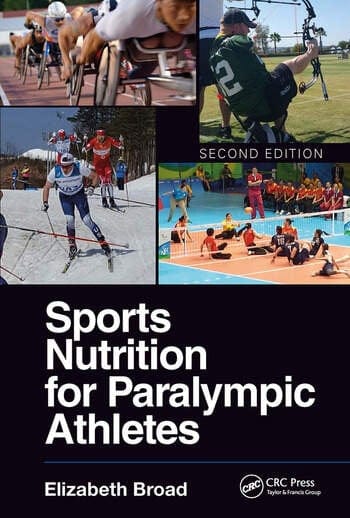
For many of us, the Olympic and Paralympic Games are a source of entertainment, inspiration, and national pride. And with Paris 2024 set to take place this summer, the excitement is already starting to build.
While we know that some of you will be looking to punch your ticket to compete at the Paralympic Games—maybe you already have—we know that most of you, like us, will be cheering on Team Canada from the comfort of our own homes.
Whether you’re an athlete or not, how you fuel your body is vital to your overall health and physical function. What you eat affects how you look and feel, supports a regular bowel program, and helps to build and maintain muscle, strengthen bones, and bolster your immune system. And because people with SCI don’t burn as many calories at rest or during exercise as they would’ve pre-injury, attention to diet and nutrition (in combination with regular physical activity) becomes even more crucial for managing weight and promoting long-term health.
“We often focus on the role of exercise in mitigating post-injury changes seen in metabolism, but what we’re seeing in the literature and in my program of research is that we’re reaching a plateau with the effect of exercise alone,” says Dr. Gary Farkas, a postdoctoral researcher at the University of Miami Miller School of Medicine and the Miami Project to Cure Paralysis. “There’s more that we can do to make an impact on the long-term health of individuals with SCI.”
According to Farkas, who studies metabolism and appetite after SCI, the relationship between diet and SCI is an area of research that is rife with opportunities. “We know a lot about post-injury changes in metabolism, and while we have relatively good research on exercise responses and interventions, we don’t really have good evidence for diet interventions,” he explains.
While exercise is one tool for managing weight and optimizing health, there are many barriers to engaging in exercise. In contrast, we all need to eat—making diet and nutrition potentially high-impact targets for intervention.

Nutrition Guidance For People With SCI: What We Know (And Don’t Know)
To date, research in this area is largely observational in nature and focused on nutritional deficiencies, dietary intake, and whether or not people with SCI are meeting nutrition guidelines. However, existing guidelines—including Canada’s Food Guide and the Dietary Guidelines for Americans—are based on evidence from people who don’t have a disability. While the general principles still apply, specific recommendations may need to be taken with a grain of salt. At this point in time, we don’t have solid evidence to say what the guidelines should be for people with SCI, says Farkas.
According to Dr. Jill Parnell, a researcher at Calgary-based Mount Royal University who studies sports nutrition for para athletes, including athletes with SCI, “There are some aspects of [the guidelines] that apply fairly well [to people with SCI], like guidance for protein intake, while there’s evidence to suggest that other nutrients are metabolized differently, or the amounts need to be different, or there are other considerations.”
“When we make practical recommendations [for athletes with SCI], we look at a combination of research done in individuals with SCI from a clinical perspective—there’s more research in certain areas related to nutrition in individuals with SCI who aren’t athletes or training at a high level—and then we also pull in the nutrition information from studies in athlete populations,” adds Parnell.
The limited availability of evidence to inform nutrition guidance for people (and athletes) with SCI places a premium on the knowledge of nutrition practitioners, like dietitians, with extensive experience working in the SCI community. People like Dr. Elizabeth Broad, an Accredited Practicing Dietitian specializing in Paralympic Sport who holds a PhD in sport nutrition, fall into this group.
Broad served as the Senior Sport Dietitian for the United States Olympic and Paralympic Committee for seven years and is the current Lead Sport Dietitian with the Olympic Winter Institute of Australia.
Athletes with SCI from across a range of sports, from shooting to wheelchair rugby, have been a key part of Broad’s work. “I’m drawing on many years of experience and a really solid understanding of where the guidelines have come from, how they’ve been developed, and what’s actually happening in the muscle, combined with a lot of observation of Para sport,” she says.
A Balancing Act
For many people with (and without) SCI, the goal is so often tied to regular exercise and a healthy diet is weight management. As many of our readers know, weight gain is a particular concern after SCI because of its impact on overall health and independence.
More specifically, SCI leads to a loss of muscle mass and reduced physical activity levels. In turn, people with SCI tend to expend less energy, both at rest and during exercise, than they did before their injury. And if energy intake (the calories you consume) exceeds energy expenditure (the calories you burn), the result is weight gain from an increase in body fat. Weight gain not only makes transfers more challenging, but it can also increase the risk of heart attack, stroke, diabetes,
and other cardiometabolic diseases.
“Calorie restriction is often needed to manage weight and prevent secondary health conditions,” says Farkas. “But what I often tell people is: Don’t think about it in terms of the word ‘diet,’ think about it in terms of lifestyle changes and long-term maintenance.”
However, in some cases, focusing too much on weight could be detrimental to health and athletic performance. According to Broad, preliminary research shows that athletes with SCI can be at risk of low energy availability. This occurs when an athlete doesn’t consume enough calories to support their training and their basic biological needs. It’s like your body goes into ‘low energy mode’—it still functions, but not at full capacity.
“One of the challenges that I’ve found is fairly frequently athletes with SCI underestimate how many calories they need to do the training,” says Broad. “When they get their injury, there’s an emphasis on ‘don’t put on too much weight’ because extra weight makes life harder. But as an athlete, you have to focus on fuelling your body for performance. You think, ‘I have to fuel, but I can’t put on weight.’ And so, trying to increase someone’s intake to fuel their training effectively can be challenging.”
Planning for Your Nutritional Needs
Whether your goal is to lose weight, build or maintain muscle, or perform at the top of your game on the Paralympic stage, what and how much you should eat depends on a wide range of factors.
“Everyone is different and requires an individualized approach,” says Farkas. “It also depends on what your goals are. Once you know your goals, we can incorporate the best evidence we have into a plan to help you achieve them.”
Parnell agrees. She focuses on three key factors when offering guidance to athletes with SCI: The injury, the sport, and the environment.
“First off, you need to consider the type and level of SCI,” she explains. “The next thing you need to take into consideration is the type of sport that they’re doing. For example, if you’re doing something like a marathon, your needs are going to be very different from someone doing a shooting event like archery. Next, you need to take the environment that you’re training and competing in into consideration. So, this upcoming Paralympics in Paris, it’s probably going to be really hot. And for someone with SCI, temperature regulation is going to be a key factor.”

“It’s all about the context and what the individual athlete is doing. You also need to consider what their clinical needs are. So, for example, we need to make sure that we’re not doing things that have major impacts on bowel,” says Broad.
If you aren’t sure how to get started but you’d like some help making changes to your diet, dietitians with expertise in SCI can be an excellent resource.
“The best route to go is consulting with a dietitian. They’re analyzing your food records. They’re taking blood. They’re measuring sweat rates. They’re measuring urine outputs. But realistically that’s not practical for most people, right? And they just don’t have access to those types of resources,” says Parnell.
If you don’t have access to a dietitian, Parnell suggests that you start by paying attention to what’s going on with your body. “If you’re gaining weight and you don’t intend to, then it’s an indication that, okay, some of your food choices are too energy dense and you need to adjust that accordingly,” she says.
You should also pay attention to how you’re feeling. “If you finish every workout feeling fatigued and you have headaches after, that’s a pretty good indication that you’re dehydrated after your workouts, and we need to do something to increase both your fluid and your electrolyte intake,” Parnell explains. “On the other hand, if you’re having to go to the washroom at inconvenient times, which is more complicated when you live with SCI, then it’s an indication that, okay, maybe I’m not drinking either the right amount or I’m not drinking it at the right time.”
If you’re in tune with your body, these are generally good indicators of when (and what) dietary changes might be needed.
Getting Started With A Healthy, Balanced Diet
Although nutrition planning is highly individualized and we don’t have enough evidence to create SCI-specific nutrition guidelines, there are a few things that everyone can do to optimize their health.
“The one thing that everyone can focus on, regardless of impairment, is a healthy, balanced diet,” says Broad. “You need to have a range of foods in your diet. You need to make sure that you’re getting a good intake of fruits and vegetables, whole grains, dairy, and good-quality protein sources. Not too much saturated fat. All of the things that we recommend for the general population absolutely apply to any athlete, and anyone with SCI.”
Canada’s Food Guide recommends eating a variety of healthy foods each day, including plenty of fruits and vegetables, whole-grain foods, and sources of protein. If you’re focused on managing your weight, being aware of portion size is also important. “We know from research that when larger portions are placed in front of you, you’re more likely to eat more than when a smaller portion is placed in front of you,” says Farkas. “Regardless of what you eat, if you eat too much relative to how much energy you expend, you’ll gain weight.”
You may also want to consider the energy density of the foods you eat—in other words, the amount of energy (or calories) per gram of food. “Foods with lower energy densities and a higher water content, like fruits and vegetables, often keep you feeling full longer,” says Farkas.
The same goes for foods with a high density of vitamins and minerals. “Choosing foods that are going to give you lots of vitamins and minerals relative to the number of calories is a good principle because everyone with SCI, athlete or not, is having to try to get more out of what they’re eating with less calories just because their energy needs are lower,” explains Parnell.
The key to success when making dietary changes is to start small and build habits that set yourself up for success in the long term, say Farkas and Parnell. For example, if you’re trying to reduce the number of calories in your diet, Farkas recommends picking one item (particularly if it has low nutritional value) to give up—like that can of soda you have with lunch every day. Try to maintain that habit for a month, and then move on to a new change while still maintaining the first change.
“It’s small changes over time that will make the biggest difference,” says Farkas. But it’s important not to restrict too many calories at once. “It needs to be slow. Maybe 100-200 calories per day. Anything above that could result in a loss of muscle. There’s also a rebound effect where the body tries to get back to its original state, so small changes are needed to offset the effect and limit reduction in muscle mass,” he explains. “Small changes on a daily basis have profound effects on monthly and annual weight changes,” Farkas adds.
“Make it as easy as possible for yourself to set yourself up for success,” recommends Parnell. “Be it meal planning or, you know, ‘I’m going to do all my shopping on whatever day’ or ‘I’m going to cut everything up so it’s available for the week.’ I think we all struggle because the reality is the current culture and foods available to us don’t set us up for success.”
Get Your Vitamin D, Eat Your Protein, and Stay Hydrated
Whether you live with SCI or not—and especially if you do the research that does exist reinforces a few specific recommendations that will help your body function at its best.
Vitamin D is recommended across the board for everyone, and particularly for people with SCI. It aids with the absorption of calcium to support bone health and helps to strengthen the immune system.
“If you look at a group of athletes with SCI, almost all of them will have low bone density in their hips. And so, can we reverse that? Probably not. Can we prevent further decline? Absolutely. That’s where vitamin D is essential,” says Broad.

“We recommend vitamin D particularly in individuals with SCI to support bone and muscle strength, but also because exposure to sunlight is often less,” explains Parnell.
Although a very recent study indicates there may be some conflicting evidence with respect to vitamin D for people with SCI, it is still likely that if you spend most of your time indoors or you like to cover up in pants or long sleeves when you do go outside, you may need to increase your dietary intake of vitamin D. Health Canada recommends a daily supplement of 400 IU if you don’t get enough vitamin D from the sun or your diet.
Protein is another key nutrient. Protein helps your body to build and repair muscles and bones, as well as make hormones and enzymes. Most adults need 0.8 grams of protein per kilogram of body weight, and athletes may need more.
“Generally, we’d say at least 1.2 grams of protein per kilogram of body weight for athletes with and without SCI,” says Parnell. It’s also important to consume protein-rich foods (or supplements, if needed) within an hour or two of working out. However, it is not simply the case that the more protein in one’s diet the better, because consuming too much protein can damage kidneys, so be sure to consult with your healthcare team and follow the recommended guidelines.
Finally, whether you’re an athlete or not, staying hydrated throughout the day is vital. We know this isn’t easy. When you live with SCI, there can be uncertainty and inconvenience involved with trips to the bathroom. But dehydration comes with several risks.
“One of the biggest issues I see in individuals with SCI, particularly related to travel, but also in some sports, is deliberate dehydration because they don’t want to have to use the bathroom or they can’t,” says Broad. “Being dehydrated puts you at increased risk of bladder infection, increased risk of reduction in performance, and increased risk of illness because it dries out your airways, which are your first line of defence against [bacterial and viral] bugs. So, it’s important that we work out a best-case scenario to minimize risk.”
Don’t Underestimate What Your Food Can Do For You
Before making any changes or adding supplements to your diet, it’s important to consult with your healthcare team, says Parnell. In general, supplements are only needed if there’s a specific nutritional deficiency in your diet.
For example, if you’re feeling fatigued every day, you may want to speak with your doctor about getting your iron levels checked. You may be at higher risk of an iron deficiency if you’re menstruating, and especially if you’re an athlete.
“Particularly in our female athletes with SCI we’ve found that iron is often sub-optimal if not clinically deficient,” explains Broad. “But because their energy requirements are lower after SCI, the ability to get the recommended dietary intake of iron is more challenging.”
Medications can also inhibit the absorption of some nutrients, so you may want to ask your doctor or pharmacist about how your medications influence nutrient absorption and what you can do to supplement or enhance absorption in other ways.
“The general idea is you don’t really recommend anything unless there’s deficiencies. And my advice would be to ask your doctor or your pharmacist about any medications that you’re taking to see if they have any influence on nutrient absorption,” recommends Parnell.
No matter who you are, paying attention to what and how you eat can be a game-changer for your overall health and fitness—and it doesn’t have to be a heavy lift.
“With the work that we’re currently doing, there’s no right or wrong answer when it comes to nutrition,” says Farkas. “It’s important to make changes in a way that aligns with your personal goals and that yield positive lifestyle changes for not just longevity but healthy longevity.”
It’s all about listening to your body, getting help when you need it, and considering the available evidence in relation to your needs. And according to Broad, it’s important to remember the role that food plays as the fuel for your body:
“Don’t underestimate how what you eat can influence how you feel physically and how your body will work for you.”
For additional resources on sport nutrition for athletes with a disability, check out the “Para Sports Nutrition” podcast with Dr. Elizabeth Broad and The Sports Nutrition for Paralympic Athletes (Second Edition) textbook. For general nutrition guidance, Canada’s Food Guide is available at food-guide.canada.ca/en.
This article was originally published in the Summer 2024 issue of The Spin. Read more stories from this issue, including:
- Adaptive paragliding
- Artificial intelligence
- Partner exercise
And more!
Read the full Summer 2024 Issue of The Spin online!





